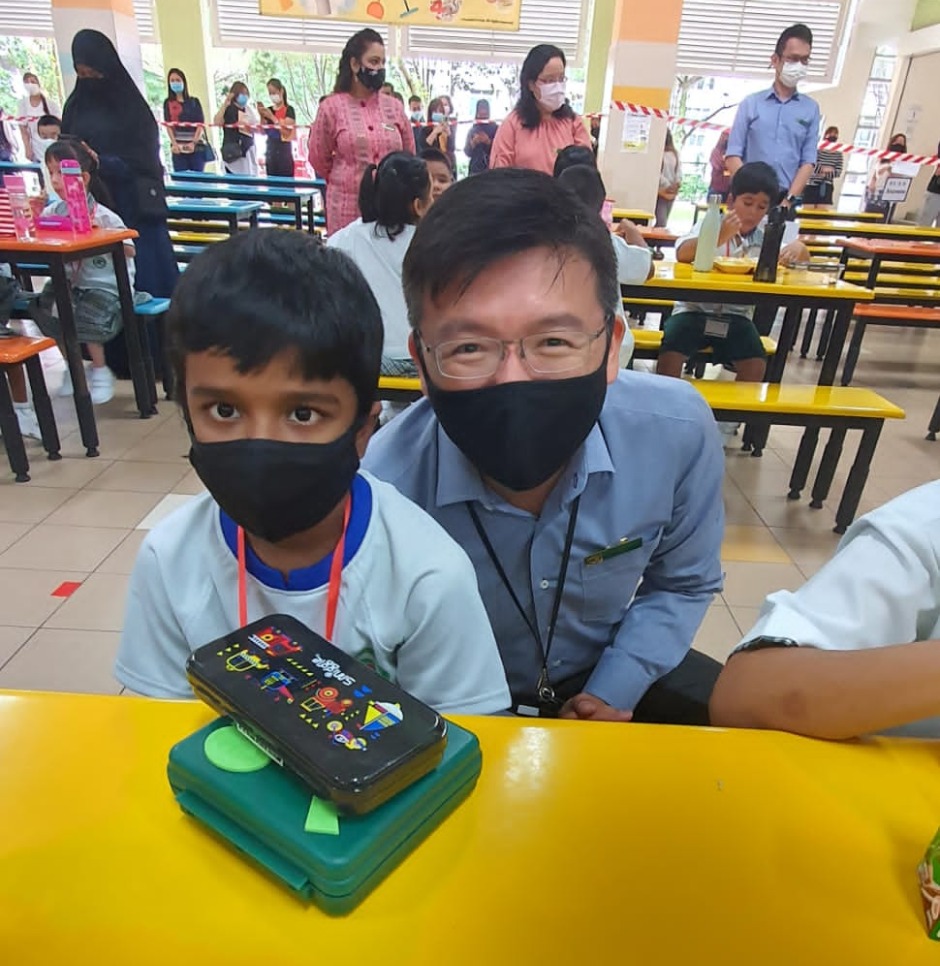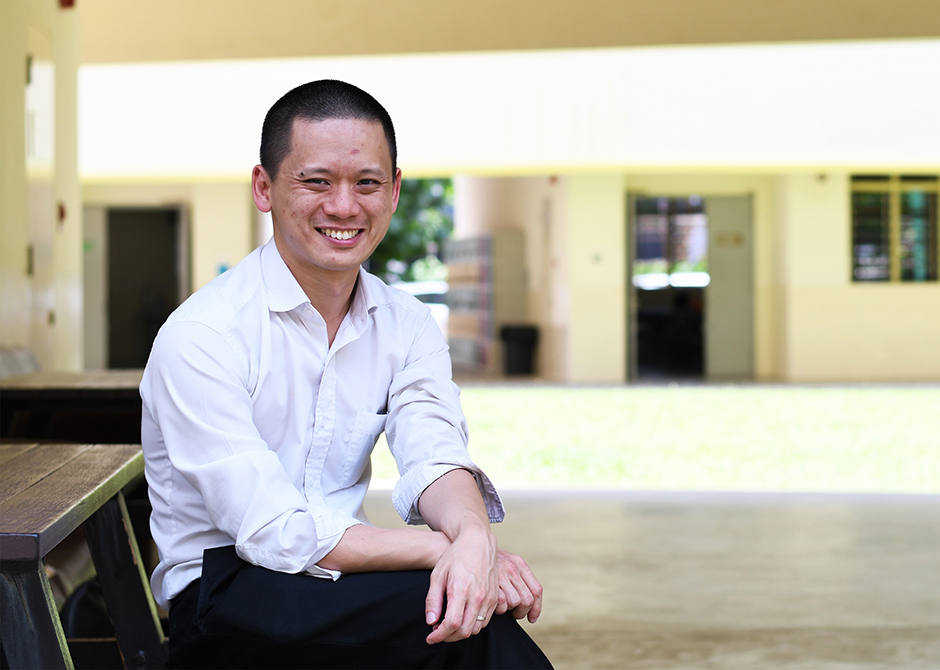Over the last two years, on the first school day of January, I have been welcoming the little ones heading to our Primary 1 classes. It is a milestone – their first step into a decade-long education journey – not just for them, but for their parents, too.
As I see the anxious, emotional faces of the parents waving their precious ones goodbye, I want them to know something that I have seen first-hand as Principal of a Primary School with an MOE Kindergarten, and previously as the Deputy-Director of the Pre-school Education Branch in MOE: Children are more capable of dealing with transition and change than we give them credit for. In most cases, they make new friends very easily, and settle into the routines of primary school with support from school and the family. So, do trust in your child’s abilities.
As a parent of two children now in Secondary 1 and 2, I have been down this path myself.
As my kids headed from pre-school to primary school, I did think about these 3 things:
- What aspect of the transition should I focus on as a parent?
- What is expected of my child in primary school?
- How can I work with the school to make this transition smooth for my child?
Most parents, today, have the same questions. So, here are some of the things that I have learnt on my journey as a parent and Principal.
Children are naturally curious, active and competent learners
Our children inherently have a propensity to learn and adapt. I encounter this all the time in my frequent interactions with children from the MOE Kindergarten (MK) in my primary school and it continues to amaze me.
Just a few weeks ago, a conversation with a Kindergarten 2 child in my MK left me feeling awed by the questions and his motivation to learn. He said that he was very curious about how life first appeared and how planets were formed, and he was looking forward to finding some of the answers to these questions when he entered primary school.
I left that encounter feeling uplifted and excited about the possibilities we had to engage with young minds.
Children are constantly asking questions, exploring to make better sense of their environments, and readily absorb information through active participation in their learning experiences. With the right support, they have unlimited ability to grow and adapt.
What can parents do
Children do best when parents, in partnership with schools, are able to tap on and further develop this natural aptitude towards learning. From a young age, you can encourage your child to look out for interesting things and changes in their surroundings and ask questions about what they observe. When walking around the neighbourhood, you can ask “Do you wonder why rainbows appear after rain?”, “What do you think you can do with empty bottles?”
Keep these questions and conversations going as your child enters Primary 1 and beyond. Your child will be astounding you with their answers, or even asking you challenging questions.
Focus on building a strong foundation
The education journey is not a sprint, but a marathon that comprises many aspects of learning beyond the academic domain. For instance, the domains of social-emotional competencies and character development are key as our young children step into the larger world of school and beyond. To get along with people, to make good decisions, to manage their own emotions… these are some of the critical life skills that we want to inculcate.
We do right by our children when we give them the time and space to build a strong foundation in different domains, so they develop the stamina and competencies to enjoy learning throughout their life and can learn independently. The adage ‘to go slow in order to go fast’ comes to mind. For instance, an over-emphasis on the academic aspects, particularly this early in life, may come at a cost. The child may lose the joy of learning and instead develop an anxiety towards learning.
So, teachers will spend the first few weeks helping new Primary 1 students get better acquainted with their new friends and familiarise them with the new spaces in the primary school. Teachers will also focus on building social and emotional skills, such as self-regulation, knowing how make friends, to take turns and how to ask for help.
They will also help the children acclimatise to the new practices and routines in a primary school, including following a class timetable, queuing up and buying food from the canteen, and asking for permission to use the washroom. I recall a Primary 1 boy in my school was nervous about buying food from the canteen on his own. His teacher introduced him to the canteen vendors and taught him to point at the items he wanted to buy if he felt too shy. This allowed him to slowly adapt and work towards speaking up.
What can parents do
Go through the school website or its social media pages with your child. Look at the photos of the events and activities to get them excited about going to school, meeting their teachers and making new friends.
You could familiarise your child with the route to school, pointing out landmarks on the way. This can help your child feel less anxious about a new environment.
At home, role-play different scenarios, for example, how to introduce themselves to their new classmates or raise questions in class.
You can provide more opportunities for independence, such as changing their clothes, washing their hands before meals or cleaning up after an activity.
Create a daily schedule that includes blocks of time for rest, play, learning and sleep to ease your child into their new routines. Once school starts, you can include blocks of time for completion of homework and the packing of their bags for the next day.
If possible, set aside a space in the home with minimal distractions. This will be the cue for your child that this place is to settle down and engage in tasks like reading or writing that require focused attention.
Some children may experience anxiety during the first few days of being in a new school environment, which in turn raises the anxiety level in us parents. This will get better once the child is more comfortable with the new environment and routines and has made new friends.
You can help by discussing and acknowledging their feelings. Children feel more reassured when their parents show a positive attitude towards their new school and learning experience, as well as show trust in the teachers.
You can also share your own experiences of doing something new or dealing with change to encourage your child.
What about the academic aspects?
Often a big concern among parents is whether your child will be able to cope with the academic demands of primary school. This worry is sometimes fuelled by misconceptions of what is expected of a child at the start of Primary 1.
In terms of language, children entering Primary 1 should be able to express their basic needs and wants, and ask and respond to simple questions. In terms of numeracy, children should have a basic understanding of numbers up to 10.
What can parents do
Have regular conversations with your child about their daily experiences. This helps to build their speaking and listening skills. Spend time reading to or reading with your children to nurture their love for reading and interest in English and Mother Tongue Languages.
You could also engage them in simple numeracy-related activities such as counting objects around the house or comparing the quantity between two sets of objects.
Teachers are there to help
Primary schools recognise that our Primary 1 students join us with different stages of readiness. Our teachers are well-equipped to assess students’ readiness to learn and their understanding of what was taught, and provide differentiated support according to students’ various levels of learning needs.
For example, a student in my school experienced difficulties speaking in her Mother Tongue Language and initially attended her Mother Tongue lessons with some apprehension. Her teacher patiently guided her and even assigned her a buddy, who would converse with her in her Mother Tongue daily. After about one term, the student’s confidence and comfort in the language blossomed.
There may be students who have additional needs that require greater transition support into Primary 1.
What can parents do
If you feel that your child is facing challenges, I would encourage you to speak to the school to share about the student’s needs and some of the strategies that have worked in supporting them.
This will allow teachers to better plan and calibrate the support for the students during the transition period and ensure greater continuity between practices in the home and school settings.
An exciting journey awaits
When I meet my P1 parents at orientation, this is what I share:
Firstly, change is a part of lives, and our children’s ability to deal with change (to be adaptable) is going to be increasingly important for them to thrive in the future. Their experience of this milestone transition from pre-school to primary school will help to shape how they perceive change. Change can be a negative experience when it happens to us, even as adults, when we have no control over it. For instance, losing a job as we saw happening to some of us during the pandemic.
But change can also be very exciting when we are part of the process and have some influence and control over it. For instance, if you are moving house or joining a new workplace.
The key idea here is to involve your children in the change. Talk to them about their concerns, assure them that you are there with them.
Secondly, as I said earlier: Trust your child’s abilities. To this I would like to add another point: Trust the school.
There is little that cannot be achieved when the school and the parents work together to bring out the best in our children.






